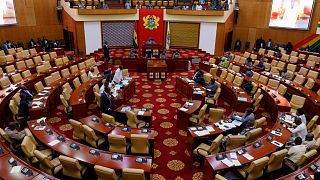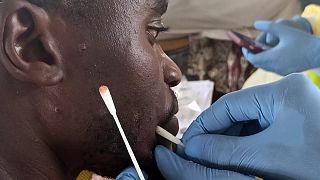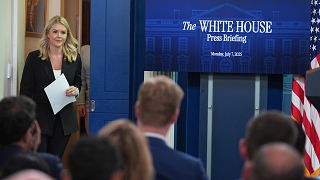Ghana
As the global financial outlook continues to look dimmer with a prolonged war in Ukraine, many African countries are bracing themselves to ride out the storm.
The African Development Bank annual meeting happening in Ghana's capital Accra, gave the opportunity for leaders to discuss the challenges that pandemic-induced losses in revenue have had on infrastructure. Ramping up climate finance was also a hot topic. This year's theme focuses on how to achieve climate resilience and a just Energy Transition for Africa.
Ibrahim Bory Camara, a member of the Guinean delgation couldn't agree more on the critical aspect of tackling climate crisis: "I believe the biggest challenge that Africa is facing is climate change, how the continent needs to adapt to all that is happening. but also how to enable Africa to open up to financial instruments in order to accelerate the development of the continent."
Delegate Sigh Diagne, from Senegal, highlighted the challenges infrastructure sector, agriculture and youth unemploymen's development faced: "We need roads, ports, railroads, motoways to move goods from point A to point B , today the infrastructural deficit has an impact on gdp and growth, we have challenges interms of youth unemployment, we have challenges in having over 50 % of the population, that are women, that are not employed and they are disproportionately impacted by climate change because alot of them are subsistent farmers."
While the South African commissioner to Ghana, Grace Mason also acknowledged the negative impact that disruptions to global supply chains had on many Africans, she pointed out that multilateral institutions like AfDB can play a significant role in the continent’s economic recovery. "It’s not tho look at challenges towards development but look at the opportunities, she says. That’s why we are here, to leverage on the opportunities, especially institutions like multilateral institutions like AFDB, interms of charting forward the development trajectory of the continent."
On Monday, AfDB approved a $1.5 billion emergency programme to alleviate the impact of worsening food insecurity across the continent.
Patrick Ndzana Olomo, a senior economist in charge of productive transformation at the African Union told Africanews that boosting domestic production is one of the key ways that economies can cushion their citizens against disruptions in global supply chains. '"There is a need for African countries to produce the goods there are consuming, this is most important inthe frame work of the AFCFTA, that provides a continental market of nearly 1.3 billion people with a combined gdp of 3 trillion USD whiich is an oppourtunty to accelerate structural transformation and industrialization."
These week-long Annual Meetings have brought together several central bank governors, ministers and delegates to discuss the impact of climate change across Africa and ways in which governments can build resilience and achieve efficient energy transitions.











11:19
Cyber Africa Forum highlights Benin's bold digital resilience [Business Africa]
01:20
Somalia launches Centennial Vision 2060 roadmap for 'peace, prospertity and progress'
Go to video
World Bank grants South Africa $1.5B for infrastructure, green energy
11:16
Angola hosts U.S.-Africa summit amid calls to revive trade ties {Business Africa}
01:30
Abu Dhabi hosts first Global South Economic Forum
01:50
Migrant workers sent US$685 Billion in remittances to families in 2024